Wolfram Function Repository
Instant-use add-on functions for the Wolfram Language
Function Repository Resource:
Evaluate the Jacobi epsilon function
ResourceFunction["JacobiEpsilon"][u,m] gives the Jacobi epsilon function ε(u|m). |
Evaluate JacobiEpsilon numerically:
| In[1]:= |
| Out[1]= |
Plot the Jacobi epsilon function over a subset of the reals:
| In[2]:= |
| Out[2]= | 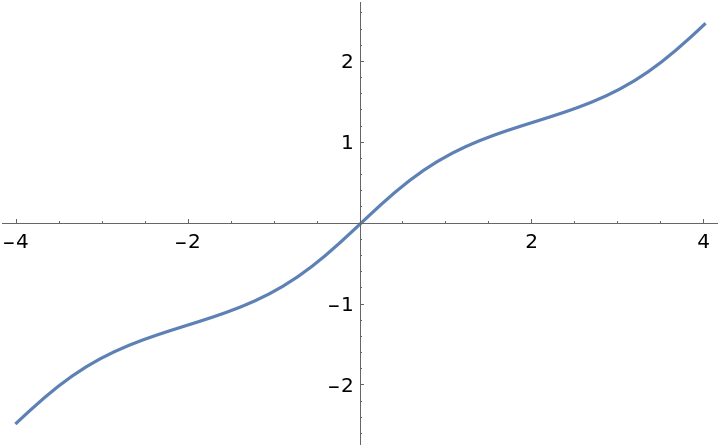 |
Series expansion about the origin:
| In[3]:= |
| Out[3]= |
Evaluate for complex arguments:
| In[4]:= |
| Out[4]= |
Evaluate to high precision:
| In[5]:= |
| Out[5]= |
The precision of the output tracks the precision of the input:
| In[6]:= |
| Out[6]= |
JacobiEpsilon threads elementwise over lists:
| In[7]:= |
| Out[7]= |
Simple exact values are generated automatically:
| In[8]:= |
| Out[8]= |
| In[9]:= |
| Out[9]= |
Parity transformation is automatically applied:
| In[10]:= |
| Out[10]= |
Plot the Jacobi epsilon function over the complex plane:
| In[11]:= | ![Plot3D[Im[
ResourceFunction["JacobiEpsilon"][x + I y, 1/2]], {x, -4 EllipticK[1/2], 4 EllipticK[1/2]}, {y, -4 EllipticK[1/2], 4 EllipticK[1/2]}]](https://www.wolframcloud.com/obj/resourcesystem/images/530/530b323d-4f5e-4c9b-8296-84774d235f06/5b3e05831f162178.png) |
| Out[11]= | 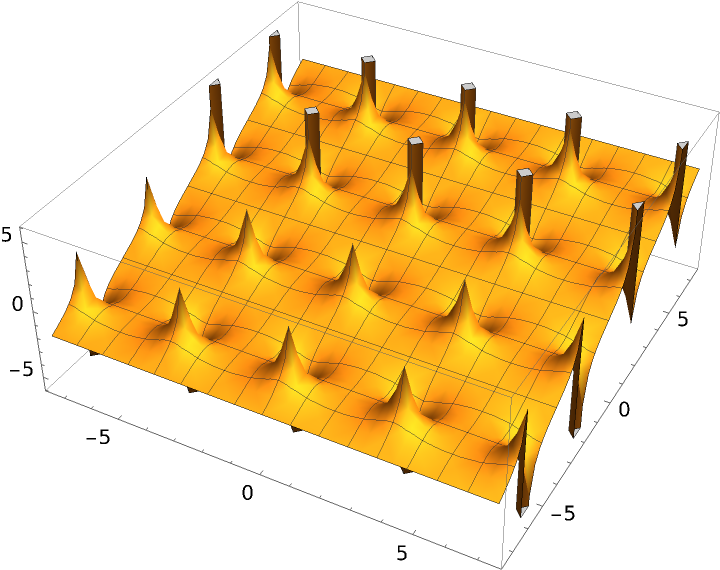 |
Motion of a charged particle in a linear magnetic field:
| In[12]:= | ![With[{\[Omega] = Sqrt[v0 \[Gamma]/2]},
x[t_] = 2 \[Omega]/\[Gamma] JacobiSN[\[Omega] t, -1];
y[t_] = 2 \[Omega]/\[Gamma] (\[Omega] t - ResourceFunction["JacobiEpsilon"][\[Omega] t, -1])];](https://www.wolframcloud.com/obj/resourcesystem/images/530/530b323d-4f5e-4c9b-8296-84774d235f06/667c7820b173b4e0.png) |
Check the solution in Newton's equations of motion with Lorentz force:
| In[13]:= |
| Out[13]= |
Plot particle trajectories for various initial velocities:
| In[14]:= |
| Out[14]= | 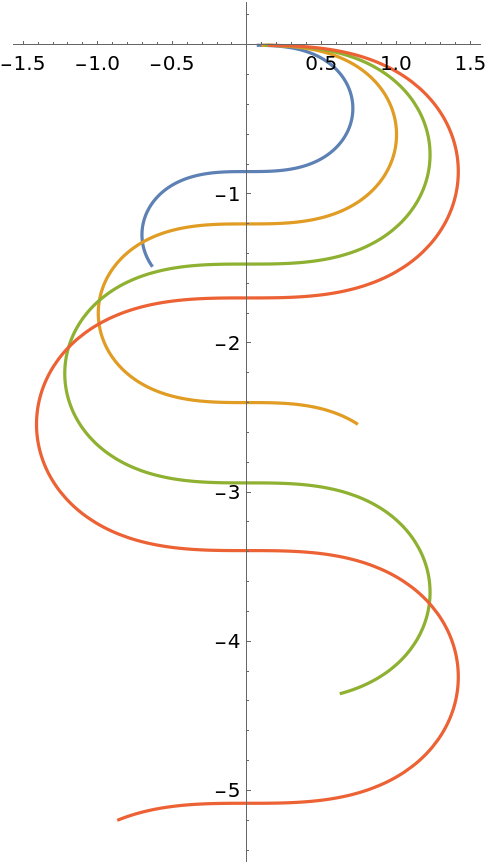 |
Parametrization of a rotating elastic rod (fixed at the origin):
| In[15]:= |
Plot the shape of the deformed rod:
| In[16]:= |
| Out[16]= | 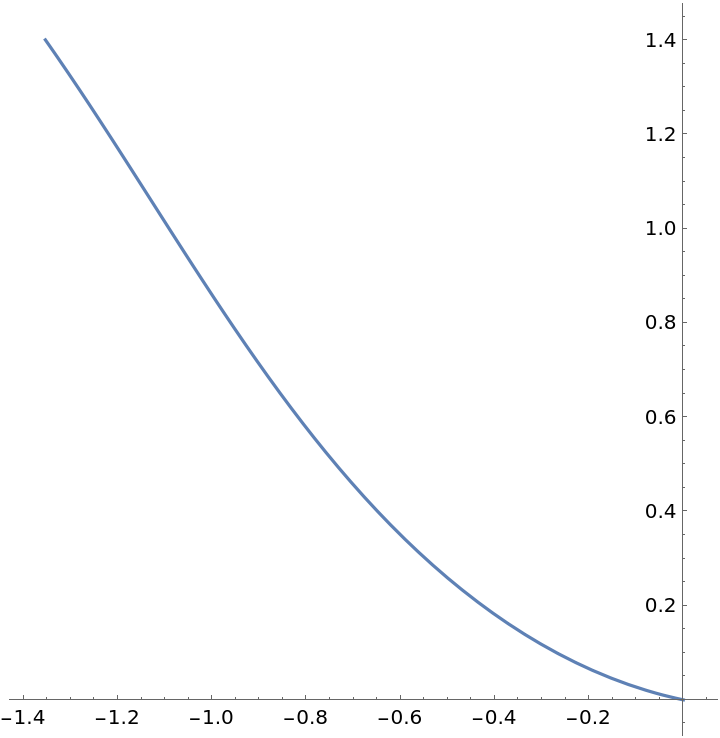 |
ε(u|m) is a meromorphic extension of the EllipticE function ![]() :
:
| In[17]:= | ![With[{m = 2/3},
Plot[{Im[ResourceFunction["JacobiEpsilon"][1 + I t, m]], Im[EllipticE[JacobiAmplitude[1 + I t, m], m]]}, {t, -7, 7}, GridLines -> {{-EllipticK[1 - m], EllipticK[1 - m]}, None}, GridLinesStyle -> Dashed]]](https://www.wolframcloud.com/obj/resourcesystem/images/530/530b323d-4f5e-4c9b-8296-84774d235f06/61982d926dadb1db.png) |
| Out[17]= | 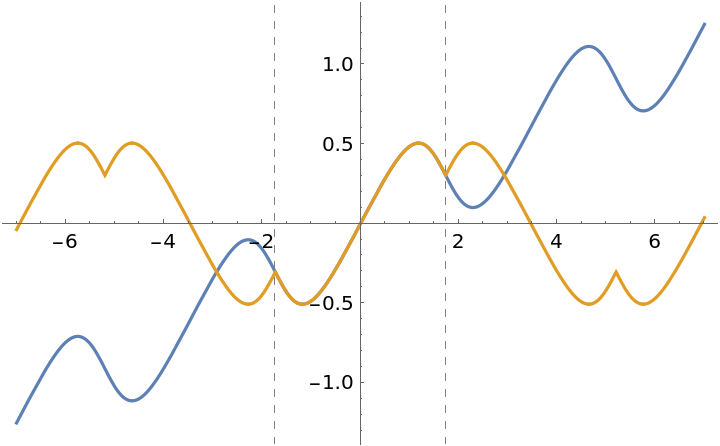 |
| In[18]:= | ![With[{m = 2/3},
Plot3D[Im[
ResourceFunction["JacobiEpsilon"][x + I y, m] - EllipticE[JacobiAmplitude[x + I y, m], m]], {x, -4 EllipticK[m], 4 EllipticK[m]}, {y, -4 EllipticK[1 - m], 4 EllipticK[1 - m]}]]](https://www.wolframcloud.com/obj/resourcesystem/images/530/530b323d-4f5e-4c9b-8296-84774d235f06/2e32a8d33b68bdbc.png) |
| Out[18]= |  |
Machine precision is not sufficient to obtain the correct result:
| In[19]:= |
| Out[19]= |
Use arbitrary-precision arithmetic instead:
| In[20]:= |
| Out[20]= |
This work is licensed under a Creative Commons Attribution 4.0 International License